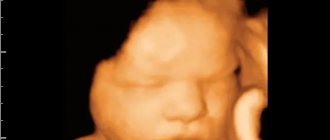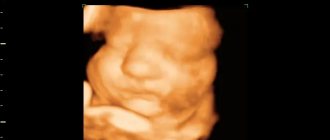Belly at 34 weeks pregnant
The belly, although it is difficult to determine visually for the pregnant woman herself, has become even larger. Now this brings a lot of inconvenience due to the difficulty in choosing a comfortable position, painful sensations in the ribs and worries that someone might hurt him. To prevent stretch marks from appearing or increasing (if they do occur), continue to use special creams, gels or oils to moisturize the skin of the abdomen.
The height of the fundus of the uterus this week is already 33.9 cm. By the way, very soon the uterus may descend, which will significantly ease the condition of the expectant mother: pressure on the ribs and shortness of breath will disappear.
The belly becomes hard at 34 weeks of pregnancy
Thus, an increase in the tone of the uterine muscles is manifested. If it is short-lived and not painful, there is nothing to worry about - it is quite possible that these are Braxton-Hicks contractions, through which the uterus is preparing for childbirth. But when the stomach turns to stone, which is accompanied by pain and discharge that differs from normal, do not expect an improvement in your health, because this may indicate placental abruption or premature birth.
Fetal movements at 34 weeks of pregnancy
Due to the fact that there is less and less space for the baby, he can no longer actively roll over. But his movements are still noticeable for the pregnant woman, because the child gains muscle mass and becomes stronger. A woman should continue to count his movements throughout the day in order to promptly identify any problems that have arisen. Typically, changes in the baby’s activity indicate a deterioration in his health, which requires urgent medical intervention.
Sex at 34 weeks pregnant
Doctors do not prohibit intimate life during pregnancy. On the contrary, it is believed that it helps strengthen family relationships and maintains a positive attitude, which is especially important for a pregnant woman. However, there are a number of reasons why it is recommended to abstain from sex. These are multiple pregnancies, placenta previa, increased uterine tone, shortening and softening of the cervix, leakage of water, etc. In the event that a gynecologist recommends refusing intimacy, do not take risks for the sake of your baby’s health. And if there are no contraindications, enjoy each other, but choose positions in which the woman is comfortable and there is no pressure on the tummy.
Good to know
Why does the baby lie incorrectly in the stomach and how to turn it over?
Placental abruption: delay is unacceptable!
Premature babies: care in the maternity hospital
How to massage the perineum against tears
Placenta - during pregnancy and after childbirth: what you need to know
How does female sexuality change during pregnancy?
All texts for pages about mother and baby were kindly provided by RAMA Publishing - these are chapters from the book by Svetlana Klaas “Your Favorite Little Man from Conception to Birth”, reviewer Irina Nikolaevna Kononova, Candidate of Medical Sciences, Associate Professor of the Department of Obstetrics and Gynecology of the Ural State Medical Academy (Ekaterinburg).
Ultrasound at 34 weeks of pregnancy
During the entire pregnancy, a woman undergoes 3 scheduled ultrasound examinations. The latter is carried out at 30-34 weeks, so you may be prescribed it this week if for some reason you have not completed it before. During the third study, all measurements will be taken again, according to which the ultrasound machine will determine the gestational age. It is also important to look at the amount of water and the degree of maturity of the placenta, because these indicators characterize the condition of the fetus. And in addition to this, the ultrasound specialist will look at the cervix using an ultrasound sensor.
Some tips
Finally, here are some relevant recommendations for the final stage of pregnancy:
- Less stress, more positive, faith in the best.
- It is better not to do any traveling or moving - contractions can start at any moment.
- You already need to choose a maternity hospital.
- Kegel exercises. They will prepare the muscles for the birth of the fetus.
- You need to take care of your skin, remove stretch marks, and remove swelling from your limbs.
- Spend more time with the people you care about most. This will charge you with the necessary vital energy.
- Photos taken during pregnancy will serve as a good memory of this most difficult, but interesting period in its own way.
Necessary tests and studies
Twice a month, a pregnant woman regularly submits her urine for analysis, which helps to monitor her condition. Also, according to indications, she is prescribed a general blood test. It happens that a woman is diagnosed with some pathology and in this case she is prescribed additional tests and examinations. For example, in case of diabetes mellitus, it is necessary to control the amount of sugar in the blood, for which a blood test is also performed.
CTG at the 34th week of pregnancy is prescribed to the expectant mother to make sure that the activity of the baby’s cardiovascular system is normal. This study allows you to determine a number of parameters, deciphering which, doctors make a conclusion about the condition of the baby.
During the examination, the gynecologist will definitely check weight changes and blood pressure to exclude the appearance of symptoms of gestosis. It is also necessary to listen to the fetal heartbeat, measure the abdominal circumference and the distance from the symphysis pubis to the fundus of the uterus. If the test results or the condition of the pregnant woman are not very good, the doctor will prescribe additional examinations and tests or even send her to the hospital. It is in order to avoid possible complications that you need to regularly visit the antenatal clinic and follow all the doctor’s prescriptions.
Caesarean section at 34 weeks of pregnancy
Childbirth at 34 weeks is considered premature, therefore a caesarean section, if performed, is done urgently. Doctors will not perform this operation without a reason. Typically, the indication is a deterioration in the health of the baby or the pregnant woman (blood flow disturbances, fetal hypoxia, placental abruption or gestosis), which cannot be stabilized with medications. If suddenly doctors send you for emergency delivery, do not set a goal to reach the victorious 40 weeks, risking your lives.
Possible problems
Pregnancy is an amazing period in a woman’s life, because it includes delight from the first kicks of the baby, and exciting anticipation, and at the same time it is associated with discomfort and painful sensations due to changes in the body of the expectant mother. It is quite possible that the pregnant woman is even accustomed to the fact that she often experiences heartburn, shortness of breath, constipation, increased fatigue and other interesting symptoms. Back pain due to a shifted center of gravity, pain and heaviness in the legs due to increased load, pulling and often painful sensations in the lower abdomen associated with sprained ligaments, painful kicks of the child - the woman has also already felt all this. She knows very well what needs to be done to alleviate her condition and has even found her own ways to deal with these manifestations. But there are a number of problems that are worth considering in more detail.
Cold at 34 weeks of pregnancy
No one is immune from colds - this is one of the most common diseases. It is not surprising that a pregnant woman can accidentally become infected, given her weakened immune system. In this case, the temperature may rise, weakness may appear, as well as a runny nose, sore throat and cough. Treatment of colds during pregnancy is mainly non-drug. The only thing that is allowed is to bring down the temperature (only if it has risen to 38 degrees) with a paracetamol tablet. Otherwise, treatment can be symptomatic: rinse the nasal cavity with saline solution and gargle with herbs. The greatest benefit will come from proper rest and plenty of warm drinks. However, if you have a tendency to edema, it is not recommended to consume too much liquid.
Diarrhea at 34 weeks of pregnancy
Diarrhea can be caused by intestinal upset due to dysbiosis or intestinal infection. In general, it cannot harm the baby, but in this case the main thing is to replenish lost fluid. If diarrhea continues for a long time, consult a doctor, since dehydration is life-threatening for the pregnant woman and her baby.
Oligohydramnios at 34 weeks of pregnancy
Oligohydramnios is generally considered a dangerous phenomenon that can harm a developing baby. In medical practice, it is divided into moderate and severe, which can be accurately determined by ultrasound. Depending on the degree of oligohydramnios, appropriate therapy is prescribed. If it is moderate, then the pregnant woman can limit herself to proper rest, maintaining physical activity, taking vitamins and proper nutrition. If oligohydramnios is severe, treatment with special medications is necessary. In any case, the woman will be under the close attention of doctors.
Stomach pain at 34 weeks of pregnancy
Abdominal pain can occur for various reasons, so you need to pay close attention to how you feel if it occurs. For example, stretching on the side may occur due to the fact that the ligaments supporting the uterus are stretched. Constipation can also cause pain. And if the pain is accompanied by the appearance of specific discharge (watery or bloody), increased uterine tone or contractions, it is better to immediately call an ambulance.
Childbirth at 34 weeks of pregnancy
Probably every expectant mother is afraid of giving birth prematurely, and it’s clear why. The baby should develop in the mother's womb for several more weeks, but instead he finds himself in a new environment. But something should reassure you: the closer you are to childbirth, the lower the risk to the health and life of the baby. He is actively gaining weight, and almost all systems of his body are developed, so some time after birth the baby will quickly catch up with his peers born on time.
Premature birth: causes, warning signs, prevention
Premature birth at the 34th week of pregnancy is not as dangerous as at earlier stages, because the baby is already formed and almost ready for birth.
The causes of premature birth can be:
- complications of pregnancy in later stages (listed in the previous paragraph);
- incorrect lifestyle of a pregnant woman;
- various diseases, stress and injuries received during pregnancy;
- pathologies in the baby.
The main harbingers of premature birth:
- aching pain in the lower abdomen;
- more frequent contractions;
- discharge of amniotic fluid;
- bleeding.
If signs of premature labor appear, you must call an ambulance, take an antispasmodic and lie down. A safe sedative - motherwort or valerian - will also not hurt. After hospitalization, doctors will determine whether it is possible to continue the pregnancy or whether it is no longer worth stopping the birth.
In case of premature birth, there should be no serious consequences for the health of the baby (if the pregnancy proceeds without pathologies). If the weight and condition of the newborn are normal, then he is left with the mother, and if there are any abnormalities, the baby is prescribed special care. For a woman, such childbirth is standard. The main thing in this situation is to identify the cause of what happened and eliminate it, so that subsequent pregnancies take place without similar complications.
Children born prematurely are placed in incubators and are under strict medical supervision
To avoid premature birth, a pregnant woman must adhere to the following rules:
- follow doctors' recommendations;
- complete all scheduled examinations on time;
- consult with specialists if you have any diseases;
- lead a healthy lifestyle;
- maintain personal hygiene;
- eat right and follow a daily routine;
- limit stress.
Photo gallery: babies born at 34 weeks
With proper treatment and care, premature babies are no different from their full-term peers
Babies born between 28 and 34 weeks are more viable than babies born earlier
At 34 weeks the baby is already developed enough to exist in the outside world
Video: features of premature birth
Recommendations for the expectant mother
- Monitor changes in your condition , and also discuss alarming symptoms with the gynecologist managing your pregnancy. You need to record changes in your weight and measure your blood pressure to rule out the development of preeclampsia. We remind you: gestosis is characterized by increased pressure, the development of edema and the presence of protein in the urine. Therefore, if your weight increases too quickly, also check for swelling by finger pressing on the shin above the bone (if the dimple persists for some time, this speaks in favor of swelling).
- Eat right. Firstly, it will benefit your figure, and secondly, it will have a positive impact on the formation of your baby’s eating habits. By reducing the amount of salt in your diet, you will reduce the likelihood of developing edema, and adding fiber will prevent constipation. And, of course, your menu should be varied and nutritious so that all the necessary nutrients enter your body and your baby. It is better to eat small portions and more often. And remember: you need to eat not for two, but for two.
- Rest more, worry less . The baby feels your condition subtly, so it is especially important to avoid all kinds of conflicts and stressful situations. And proper rest will help you recover from the load, which by 34 weeks has already increased quite significantly.
- Take a walk in the fresh air. This is good for your figure and also saturates the body with oxygen. In addition, it is believed that after a good walk you sleep better. If you have trouble sleeping, an evening walk may be one solution.
- If you have not yet had time to pack your things for the maternity hospital, do this so as not to run around in a panic at the last moment. Now you can calmly assess what you will need and certainly won’t forget anything. You can also think about choosing a maternity hospital in order to feel comfortable in the institution where you will be during childbirth and after - with the baby.










